
Jewish Voice for Peace held its largest-ever national member meeting in Baltimore earlier this month, with more than 2,000 attending. We feature the address of Democratic Congressmember Rashida Tlaib of Michigan, the only Palestinian American member of Congress, who addressed the conference as it began. “Why is it that our government always has enough money for bombs, to bomb people, to kill people, but never seems to have money to provide people with healthcare, with housing, enough food for their families?” Tlaib asked in her address.
Transcript
AMY GOODMAN: This is Democracy Now!, democracynow.org, The War and Peace Report. I’m Amy Goodman.
As Israel’s total blockade on Gaza is now in its 71st day, a widely used global hunger tracking tool warns Gaza’s entire population is at critical risk of famine. Half a million of those are now facing starvation. The group Save the Children warned today that nearly all Gaza’s children — some 930,000 children — are at risk of famine. Gaza’s hospitals remain overwhelmed amidst Israel’s relentless bombardment, are in urgent need of critical supplies. Israel killed at least 17 Palestinians at a school turned shelter today, including at least five children.
Meanwhile, Hamas is expected to imminently release the last U.S. hostage, the American Israeli soldier Edan Alexander, after engaging in talks with the Trump administration in what analysts say could lead to a new ceasefire, after Israel unilaterally shattered an earlier ceasefire in March.
This all comes as a U.N. special committee warned Israel appears poised to enact another Nakba — referring to the mass expulsion of Palestinians in 1948 when Israel was created. The committee said, quote, “Israel continues to inflict unimaginable suffering on the people living under its occupation, whilst rapidly expanding confiscation of land as part of its wider colonial aspirations,” unquote.
We’re going to turn right now — we were hoping to turn to Abubaker Abed, who is a young Palestinian journalist in Gaza, did not plan to be covering war, calls himself an accidental war correspondent, was suffering malnutrition, was able to get out and went to Ireland. But we seem to have lost connection with him.
While we see what happens with that, we want to turn right now to Rashida Tlaib, the only Palestinian American member of Congress. Last weekend, she attended the largest-ever national member meeting of the organization Jewish Voice for Peace. More than 2,000 people attended. Democratic Congressmember Rashida Tlaib thanked them and addressed the conference. This is a part of her remarks.
REP. RASHIDA TLAIB: I was born and raised in the most beautiful, Blackest city in the country, where every corner is a reminder of movement work. I’m also a proud eldest daughter of 14 — yes, Palestinians have lots of babies — and, of course, my two Palestinian parents, my mother who grew up in the West Bank, and my father in a little village outside of Jerusalem.
But today I want to talk a little bit about addiction, our country’s addiction to war, a country addicted to extraction, to death. You know, the president of the United States currently has requested a trillion-dollar military budget, the largest military budget in the history of our nation. But the Pentagon can’t even pass an audit, y’all, seven audits in a row. When folks in town halls in my community ask me, you know, “Well, talk about efficiency and, you know, waste,” I was like, “They need to start with the Pentagon.” And people just scream. And they said, “Absolutely.”
You know, we already know, and I know all of you have heard Dr. King say that a nation continue — that continues year after year spending more money on military defense than on programs of social uplift is approaching spiritual death. We’ve all heard that. You know, why is it that our government always has enough money for bombs and bombing people, to kill people, but never seems to have money to provide people with healthcare, with housing, enough food for their families?
I tell my colleagues all the time I got schools in my community with garbage bags over their drinking fountain. You know, I always remember hearing Shirley Chisholm talk about — the first Black woman ever elected to Congress talk about children can’t learn if they’re hungry. Well, children can’t learn if they’re being poisoned, not only by the water, but the dirty air.
You know, people in our country every single day are dying because they can’t afford healthcare. That’s why you hear people say we don’t have healthcare, but we have sick care in our country. More than 60,000 of our neighbors in our country die because they can’t afford to see a doctor.
So I’m sick and tired of them saying we don’t have money for resources here at home. And it’s a policy choice. We all know this. But I say this because of right now they are cutting Medicaid, which is a Band-Aid to sick care right now. And, you know, leaving, coming here from the Hill, watching them claim that they’re not doing it, gaslighting, it reminded me, them, of gaslighting the American people: “We’re not supporting genocide.”
We must continue to come together and choose our communities over wars and genocide. And, you know, and I don’t know why it continues to be controversial to say we must stop bombing people. I still remember in the early days of the genocide, we couldn’t even say “ceasefire.” So, to say, “I don’t want our tax dollars used to dismember children or stop killing them,” that should not be controversial.
When I got elected in 2018 and sworn in in 2019, I remember talking to my cousin who lives in Ramallah. And she told me — you know, it was this moment that we had. You know, I’m the older one, and she’s — I always see her still like she’s 11, 12. She’s in her thirties, has twin kids, twin boy and a girl. And she just very, like, quietly says, “We thought they just wanted us all to die.” And I was like, “Who?” “America, until you got elected.” And I was like, “What?” She goes, “Rashida, you don’t understand. We’re like, well, they elected Rashida. They must not want us all to die.” No, it’s so sad, though, because she said it — she was saying it in Arabic to me. And I said, “No.” I said, “You should come meet JVP Detroit.”
I told her, “Cuz, oh my god, you’ve gotta meet” — because before I met all of y’all, rest of the JVP family, I had JVP Detroit. Now, JVP Detroit, Jewish Voice for Peace in Detroit, you don’t understand. It was before the genocide. They were on the line trying to prevent shutoffs of water. They were on the line saying, “We’re not going to allow you to build a stadium while taking money from schooling.” So, they’ve been out on the frontline to speak truth to power consistently. I mean, they experienced doxxing before doxxing was even a thing. And I tell her, “You don’t understand. You have to come and see this incredible community in Detroit that says, 'Save lives. Palestinians deserve to live. Palestinian children deserve to grow old.' I wish, Shireen, you could see it.” But they don’t get to always see it.
You know, I know that many of you understand our shared humanity. That’s why you’re here. That’s why you’re part of this movement. But especially in the face of dehumanizing the, you know, violence and the despair, we know that every life is sacred, no matter somebody’s ethnic background or faith. And we must work together for freedom and safety for all and real, true, peaceful coexistence for every faith. I still remember my sity telling me the story of picking olives next to his Jewish neighbor. That’s what I want. I don’t want somebody being othered or seen as less than solely because they were born Palestinian.
So I’m grateful for all of your voices in this movement. We know that many people around the world are with us, committed to ending the genocide in Raza, apartheid in all parts of occupied Philistine, and recognizing humanity in every person.
AMY GOODMAN: That’s Democratic Congressmember Rashida Tlaib of Michigan addressing the Jewish Voice for Peace national meeting in Baltimore. Over 2,000 people attended.
That does it for our show. As we end the program, 20 years ago this month, Democracy Now! published the first audio edition of our headlines in Spanish, Democracy Now! en Español. Those headlines are broadcast by hundreds of stations from the Americas to Europe and available as a podcast to this day. Today we also translate our segment summaries, select transcripts, weekly column into Spanish and produce Spanish-language interviews. A huge shoutout to our current Democracy Now! en Español team, Clara Ibarra, Igor Moreno, Iván Hincapié, and to Andrés Conteris, who worked with us to launch Democracy Now! en Español 20 years ago. Special thanks to María Eva Blotta, Verónica Gelman, Chuck Scurich — we hope you feel better — and all the interns who’ve contributed over the two decades. I’m Amy Goodman.

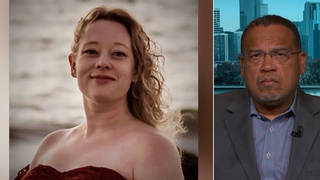
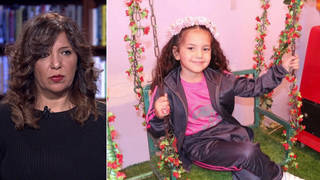
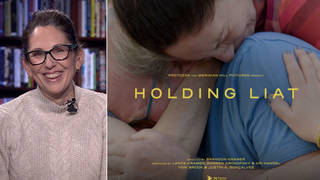
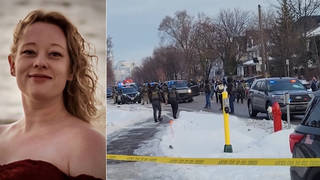
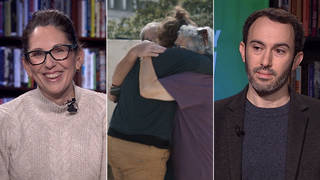

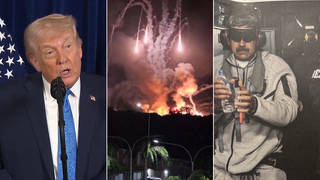
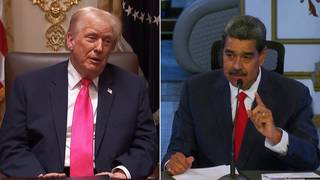

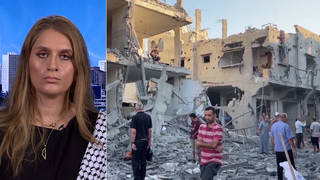

Media Options